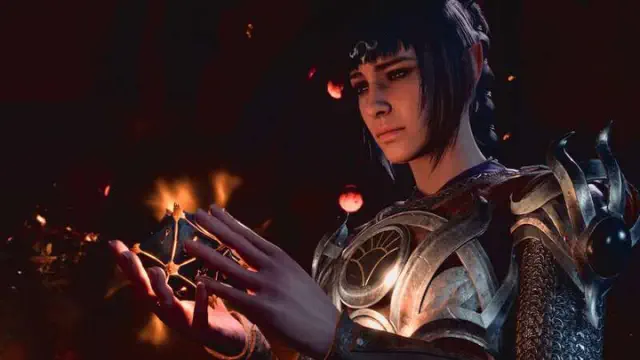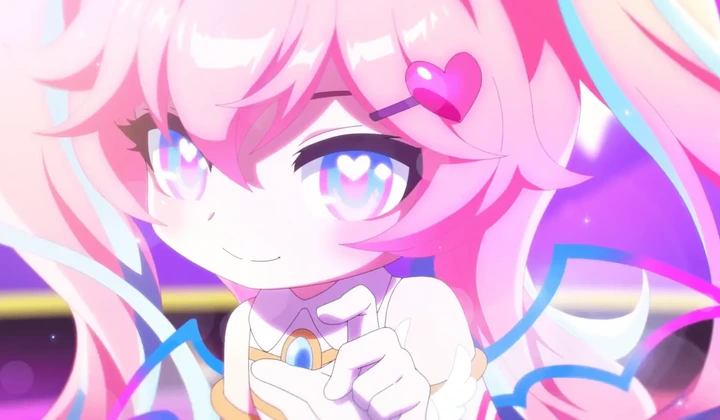
View pictures in App save up to 80% data.
It was a late hour, and the animation studio run by Darim had just wrapped up creating a fresh design for a character in one of South Korea's beloved video games, MapleStory.
Darim felt a sense of pride in her accomplishments. Alone on the floor of her cozy studio apartment, she decided to share the trailer on social media. Within moments, a deluge of hateful messages poured in, filled with threats of violence and abuse.
Young male gamers expressed their concerns over a specific moment in the trailer, where the female character was depicted with her thumb and forefinger positioned closely together.
They believed it resembled a hand sign that was once popular among a radical online feminist group nearly ten years ago, which aimed to mock the size of Korean men's genitalia.
"There were derogatory remarks I had never encountered before; they were vile and inhumane," stated Darim, a pseudonym. One of the messages said: "You've just undermined your employment."
Messages quickly flooded Darim's studio, with the game developer facing accusations of being a feminist and calls for her termination. Within a matter of hours, the company decided to retract the promotional video.
Darim found herself as the newest target in a troubling pattern of aggressive online campaigns, where men in South Korea launch attacks on women they believe hold feminist beliefs. These individuals inundate their victims with harassment and attempt to have them dismissed from their jobs.
This reflects an increasing pushback against feminism, where feminists are often labeled as man-haters who should face consequences. These witch hunts are creating a stifling atmosphere for women, causing many to feel fearful about openly identifying as feminists.
This is forcing the movement underground, in a country where gender discrimination is still deeply entrenched. South Korea has the largest gender pay gap in the OECD, a group of the world's rich countries.

View pictures in App save up to 80% data.
The hunts are frequently led by young male gamers and focus on women in the gaming industry, such as Darim, but have recently expanded to include individuals from various other professions.
They search for any signs of what they call the 'finger-pinching gesture' and interpret it as evidence that women who harbor disdain for men are covertly ridiculing them.
As soon as they perceive what they believe to be a clue, the search is on. "They conclude that a sinister, malevolent feminist is lurking within the organization, and her existence must be destroyed," said Minsung Kim, a 22-year-old male gamer who, alarmed by these witch hunts, established a group to aid the victims.
The witch hunters pursue every female staff member at the targeted company, scouring their social media profiles for any signs of feminist views. Deep in Darim's timeline, they stumbled upon a post that they deemed 'problematic.'
In reality, Darim was not involved in the controversial segment of the animation, yet her studio faced a barrage of criticism. This situation escalated notably when Nexon, the gaming firm, abruptly took down all of the studio's artwork from their lineup and publicly apologized to their clients.
"My company and the CEO were in a state of frenzy," Darim recounted. "I genuinely feared I would lose my job and that my chances of working in animation would be over forever."
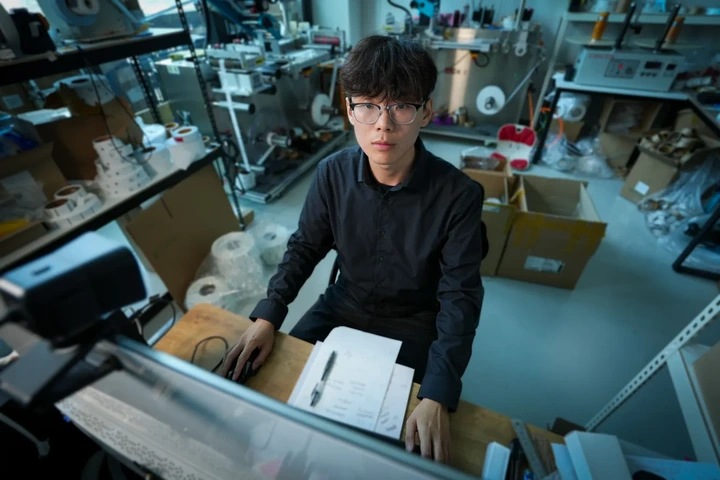
View pictures in App save up to 80% data.
At that point, Minsung's organization intervened. They encouraged her studio to disregard the gamers and offered to cover Darim's legal expenses to enable her to report the harassment. "We emphasized that these demands would continue indefinitely unless addressed immediately," he explained. The studio took their advice, and as a result, Darim retained her position.
But similar witch hunts have worked, in the gaming industry and beyond, and they are becoming more frequent. In one case, a young illustrator lost her job after a handful of disgruntled gamers stormed the company's office demanding she be removed.
It's not only Korean firms that have succumbed to pressure. In the previous year, the global automotive giant Renault placed one of its female staff members on suspension after she faced allegations of making a finger-pinching sign during a promotional presentation while gesturing with her hands.
"These anti-feminists are becoming increasingly organized; their strategies are becoming more defined," Minsung remarked. "They've taken a common hand gesture that people use and twisted it into a mark of shame, allowing them to label anyone as a wicked feminist," he explained.
He stated that the companies are succumbing to these unfounded allegations, which has given the instigators of these campaigns a sense of empowerment. "They now believe that simply labeling someone as a feminist can destroy their professional life," he remarked.
Minsung understands well, as he was once among those men not too long ago. He participated in anti-feminist forums, recalling, "We encounter the unfiltered internet at an incredibly young age," having started his online journey at just nine years old.
It was after Minsung transitioned from playing video games to engaging in real-life games like Dungeons and Dragons that he began to meet women, leading to a transformation in his perspective. He described himself as an "enthusiastic advocate for feminism."
In South Korea, women frequently face discrimination and misogyny in both professional and domestic settings. However, as they advocate for their rights, a growing number of young men have begun to feel that they are the ones experiencing discrimination.
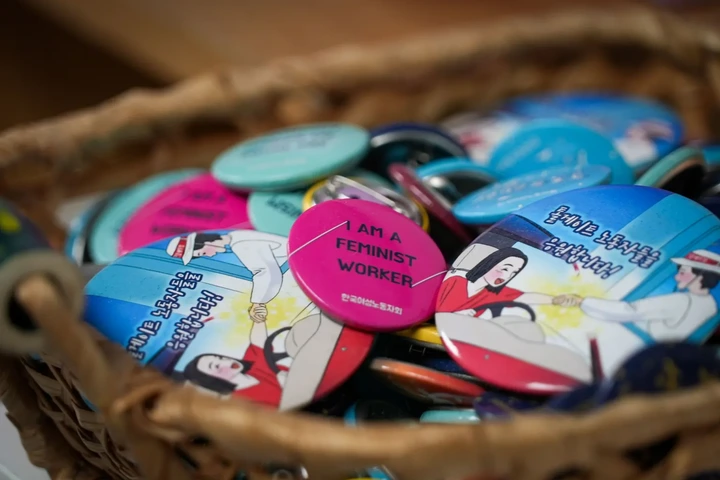
View pictures in App save up to 80% data.
The backlash began in the mid-2010s, following a surge of feminist activism. During this time, women took to the streets in protest at sexual violence and the widespread use of hidden cameras that secretly film women using toilets and changing rooms - around 5,000 to 6,000 cases are reported annually.
"Myungji Yang, a sociology professor at the University of Hawai'i Manoa, noted that young men have observed women becoming more assertive and feel threatened by this shift. In her interviews with numerous young Korean men, she found that they often encounter feminism through online platforms that present extreme stereotypes of feminists. 'This exposure leads to a skewed perception of feminism,' she explained."
One of the issues they raise is the 18-month mandatory military service that men are required to fulfill. According to Hyun Mee Kim, a cultural anthropology professor at Yonsei University in Seoul who specializes in feminist studies, many of these individuals leave the military with a sense of entitlement to secure a desirable job.
With an increasing number of women joining the workforce and competition for jobs intensifying, some men perceive that their chances for employment are being unjustly diminished.
These sentiments have been echoed by South Korea's currently suspended and disgraced President, Yoon Suk Yeol, who assumed office in 2022 with an anti-feminist agenda. He asserted that gender discrimination was a thing of the past and has since attempted to abolish the government's ministry dedicated to gender equality.
Even more astonishing than the opinions they express is the fact that the individuals who hold these views wield significant influence over large corporations.
Removing fingers from images

View pictures in App save up to 80% data.
I visited Pangyo, often referred to as South Korea's Silicon Valley, to meet a woman with two decades of experience in the gaming sector. Following the Darim incident, her company began modifying all its games by altering characters' hands to form fists, effectively eliminating fingers to prevent any potential backlash.
"It's tiring and infuriating," she stated, requesting to remain unnamed. "The notion that a simple hand gesture could be interpreted as an assault on men is ridiculous, and businesses ought to disregard it."
When I inquired about their absence, she explained that numerous developers hold similar anti-feminist perspectives as some gamers. "While there are many voices outside protesting, there are also individuals within the industry who share these negative beliefs."
Next, we must consider the financial implications. The men are threatening to withdraw from the games if the companies do not take action.
"Minsung stated, 'The gaming firms believe that anti-feminists represent their biggest revenue stream.' Following the targeting of Darim's company, Studio Ppuri, it reported a loss of almost two-thirds of its contracts with gaming studios."
Studio Ppuri did not reply to our inquiries; however, both Nexon, the game developer, and Renault Korea expressed their opposition to all types of discrimination and bias.
There are indications that the authorities are yielding to the demands of anti-feminists. For instance, when Darim sought help from the police regarding her abuse, they declined to accept her case.
They claimed that since the finger-pinching gesture was considered taboo, it was "reasonable" for her, being a feminist, to face such an attack. "I was shocked," she remarked. "Why didn’t the authorities come to my defense?"
In response to backlash from feminist groups, the police have reversed their earlier stance and are now conducting an investigation. The Seocho district police issued a statement to the BBC, acknowledging that their original choice to close the case was "inadequate" and emphasized that they are "doing everything possible to track down the suspects."
The situation left Darim's attorney, Yu-kyung Beom, utterly astonished. "In South Korea, declaring yourself a feminist requires immense courage or a touch of madness," she remarked.
Attacked for sporting a short hairstyle.
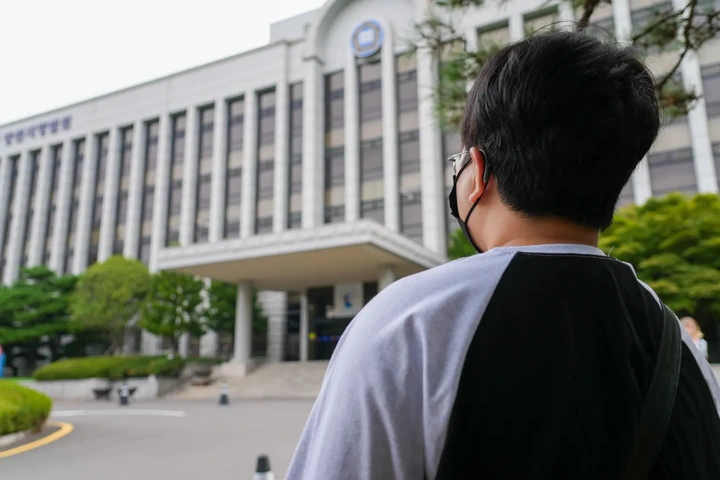
View pictures in App save up to 80% data.
In November 2023, the turmoil escalated from the digital realm into the physical world. A young woman, referred to as Jigu for anonymity, found herself working alone in a convenience store during the late hours when a man entered and began to assault her.
"He remarked, 'Hey, you’re a feminist, aren’t you? You definitely look like one with that short hair of yours,'” Jigu shared with me, her voice tinged with anxiety as she recalled that fateful night. The man then shoved her to the ground and began to kick her. “I kept fading in and out of awareness. I genuinely believed I might not survive."
Jigu never identified as a feminist; she simply preferred her short hair and felt it complemented her style. Unfortunately, the assault has resulted in lasting injuries for her. Her left ear suffered damage, and she now relies on a hearing aid.
"I can't shake the feeling that I've transformed into someone entirely new," she remarked. "My smile has faded. There are days when just existing feels like torture; the recollection of that day remains vivid in my mind."
The perpetrator received a three-year prison sentence, marking a significant moment as a South Korean court acknowledged for the first time that the crime was driven by misogyny. Essentially, it was determined that Jigu had been targeted because she resembled a feminist.
In the midst of the assault, the individual claimed affiliation with a radical anti-feminist organization known as New Men's Solidarity. The group's leader, In-kyu Bae, has urged men to stand up against feminists. Therefore, one evening, while he was hosting a live-streaming event in Gangnam, a vibrant district in Seoul, I decided to approach him for a conversation.
"From the top of a black van equipped with loudspeakers, he exclaimed, 'I’m here to say that these feminists are spreading hatred across the nation!'"
"The individual who assaulted Jigu isn't affiliated with us. We don't have any members; we're just a YouTube channel," he said while live-streaming to thousands of followers. Meanwhile, a handful of young men in attendance were cheering enthusiastically.
"We have never promoted the use of violence. In reality, it is the feminist groups that engage in aggressive behavior. They are the ones shaming men's masculinity," he remarked.
In the previous year, Mr. Bae along with a group of his followers was found guilty of defamation and insulting a feminist activist, following a prolonged period of harassment that lasted over two years.
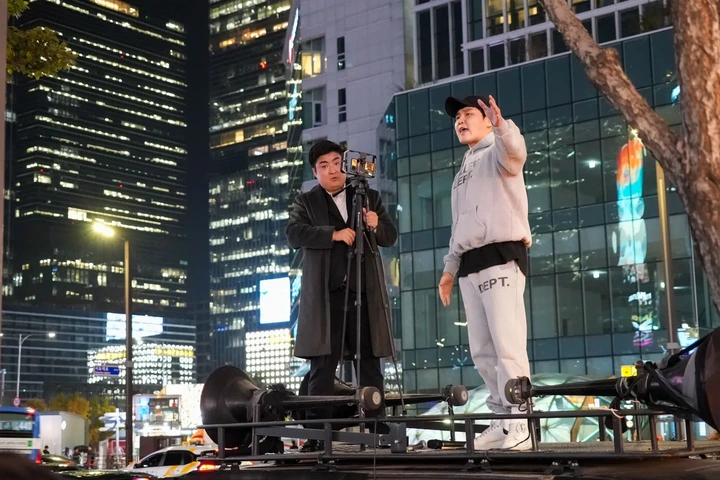
View pictures in App save up to 80% data.
Anti-feminist sentiments have gained significant traction, prompting Yuri Kim, the director of the Korea Women's Trade Union, to create a committee dedicated to monitoring instances of what she refers to as "feminism censorship." In her findings, she noted that some women are being interrogated about their feminist beliefs during job interviews, and in workplace environments, it is not uncommon for women to encounter remarks such as "all feminists should perish."
As stated by Professor Kim, an expert in feminism, some men are currently leveraging feminist concerns in the workplace as a means to intimidate and dominate their female coworkers. This tactic serves as a message that implies, "We're keeping an eye on you; it's best to toe the line."
Such harassment is proving effective. Last year, a pair of scholars coined the phrase "quiet feminism" , to describe the impact of what they say is a "pervasive everyday backlash".
Gowoon Jung and Minyoung Moon discovered that many women, despite embracing feminist ideals, felt uncomfortable expressing these views openly. Some women I interviewed expressed their fear of getting short haircuts, while others mentioned that feminism has become so closely linked with anti-male sentiments that they no longer identified with the movement.
A 2024 IPSOS poll of 31 countries found only 24% of women in South Korea defined themselves as feminist, compared to an average of 45%, and down from 33% in 2019.
Professor Kim expresses concern that the repercussions will be dire. She contends that by being compelled to hide their feminist beliefs, women are losing their capacity to combat gender inequality, which pervades workplaces, political arenas, and everyday public life.
Feminists are currently engaged in discussions on how to stop the ongoing witch hunts. A straightforward solution is to implement legal reforms. In South Korea, there is a lack of comprehensive anti-discrimination legislation that safeguards women and prevents them from losing their jobs due to their opinions.
It has faced consistent opposition from politicians, primarily due to its support for gay and transgender individuals. Additionally, anti-feminists and certain trans-exclusionary feminists are now actively campaigning against it.
Minsung is convinced that the key to diminishing the power of the witch hunters lies in the willingness of corporations and government bodies to confront them. He points out that they represent only a tiny percentage of the male population in South Korea, yet their voices are disproportionately loud and their influence is strangely amplified, he contends.
Following her assault, Jigu has embraced her identity as a feminist with pride. "I aspire to connect with other survivors who have faced similar struggles, and if just one woman finds the courage to take my hand, I am here to support her."









